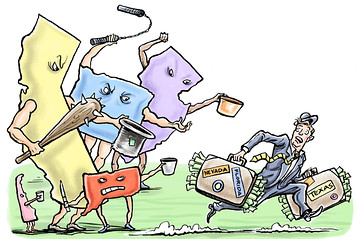Tax Refugees Flee to States with Lower Taxes
When I left California just over a year ago to move to Minnesota, I did so not only to start my position at the Center but to also flee one of the worst taxed states in the country.
I knew I was giving up nice weather year-round, but I also quickly found out I was moving to another not-so-nice tax climate, as well.

Only two spots ahead of California, Minnesota ranks 46th out of 50 for worst overall tax climate. Minnesota’s lowest individual income tax rate (5.35 percent) is higher than 17 other states’ highest individual income tax rate. And the state’s corporate income tax rate is higher than California’s.
The Center published a report by Peter Nelson in 2016 titled “Minnesotans on the Move to Lower Tax States.” Internal Revenue Service data makes it possible to track households moving into and out of each state, and with few exceptions, Minnesota loses taxpaying families to lower-tax states.
And now there’s a name for those who flee: tax refugees.
According to an article by The Australian, taxpayers in high-taxing states are flocking to cheaper states.
More and more, Americans are voting with their feet to flee high-taxing states for states with lower taxes. It’s a phenomenon that is tipped to accelerate after Donald Trump’s recently passed tax reform package removed key deductions for those living in high-tax states such as California, New York and New Jersey, making it even more expensive to live there.
…U.S. states can set their own levels for all their taxes, including state income tax (levied in addition to federal income tax), property taxes and sales tax. This leads to sometimes vastly different levels of state income tax. For example, California has a top marginal personal income tax of 13.3 percent, New York has 12.7 percent and Florida and Texas have no income tax.
But what now makes this issue so politically sensitive is that the tax flight across the U.S. has become a virtual one-way flow—from high-taxing Democrat states to low-taxing Republican states.
The willingness of people to move into, and out of, states is connected to whether a state has high or low taxes.
For the past decade [Jonathan] Williams [chief economist for the Centre of State Fiscal Reform], along with fellow conservative economists Stephen Moore and Ronald Reagan’s former economic adviser Arthur Laffer, have tracked migration flows and paired them with state tax levels and other economic factors.
They found that from 2006 to 2015, the biggest net migration losses were from high-taxing states such as New York (1.38 million), California (1.1 million), Illinois (690,000), Michigan (593,000) and New Jersey (525,000). Each of these are high-tax Democrat states, except for Michigan, which narrowly voted for Trump in 2016.
By contrast, the states with the biggest net inflow of people were Texas (1.47 million), Florida (779,000), North Carolina (609,000), Arizona (450,000) and Georgia (378,000). Each of these are low-taxing Republican states.
When people leave, money leaves, and it is costing high-taxing states a pretty penny.
In financial terms, the most recent data also shows a wealth flow from high-tax states to low-tax states. Between 2012 and 2015, Illinois lost $US13.6 billion in adjusted gross income, while New Jersey lost $US8.5 b[illion] and Connecticut lost $US6.2 b[illion]. Meanwhile, Florida gained $US39.3 b[illion].
Granted, the decision to leave a state is usually motivated by the interplay of multiple factors, but tax policies do influence movement. High taxes diminish economic freedom—”the ability of individuals to act in the economic sphere free of undue restrictions”—and can lead to more regulations and fewer job opportunities. People move because of jobs, but jobs move because of taxes.
So, where does this leave Minnesota? Join the Center tomorrow, Wednesday, February 21st at the Hilton Hotel in Minneapolis for a lunch forum with Stephen Moore as he discusses the recent tax reform law and what it means for you.
Tickets can still be purchased here. Students and chaperones can attend for free by calling 612-584-4557 to register.